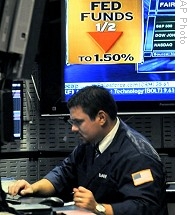VOA标准英语10月-World Economy Heading into Major Slowdown, says I(在线收听)
 |
| Olivier Blanchard (undated photo) |
IMF chief economist Olivier Blanchard says the financial crisis will significantly slow global growth during the next year. Speaking at the start of the Washington annual meeting of the IMF and World Bank, Blanchard said the crisis is having its severest impact in advanced economies.
"We predict that growth in advanced countries will be close to zero, or even negative, until at least the middle of 2009, with a slow recovery until the rest of the year," he said.
Blanchard, a French economist and professor at the Massachusetts Institute of Technology, says world growth has been sustained by robust growth in China and India. But, he says emerging markets will soon feel the effects of the financial crisis, as well.
"All, or nearly all [emerging economies], will suffer from lower exports to advanced economies, and this will slow down their growth," he said. "Most will suffer from more expensive foreign credit. We are already seeing this happen."
 |
| Wall Street trader, 08 Oct 2008 |
In preparing its forecast, the International Monetary Fund assumed coordinated action by the Americans, Europeans and Japanese to stimulate growth and avoid a global downturn. The Fund says, after safeguarding financial institutions, governments should use fiscal policy to put more money into the hands of consumers.
IMF economists applaud Wednesday's action by major central banks acting in concert to cut interest rates, a move intended to boost consumer demand by making the cost of credit cheaper. This followed a series of measures taken in recent days to ease the credit crunch, but stock markets have continued to fall amid concerns about global recession.
Blanchard says the financial shock that first shook banking institutions has spread to businesses and consumers.
"Now, consumers and firms have weathered the recent oil and commodity price increases surprisingly well," said Blanchard. "Consumption and investment demand remain quite strong. But, what we see now is that demand is falling very sharply."
Blanchard and his IMF colleagues say there is no chance of a repeat of the global depression of the 1930s, because the lessons of that painful decade have been learned. Foremost among them is that consumer demand must be maintained, so that economic activity does not spiral downward amid corporate failures and steeply rising unemployment.